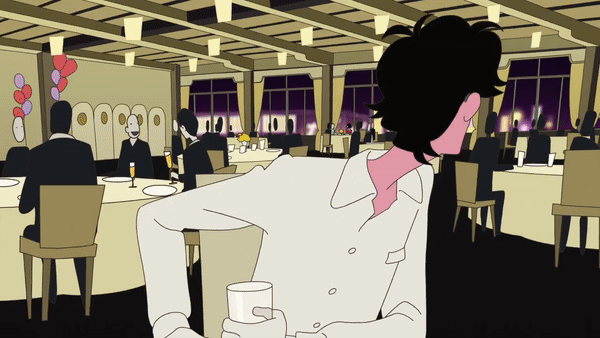Review by Jordan Collier
It has become sort of a running gag with my peers that I only like movies that are depressing, violent, or somewhere in between. I like to think this isn’t true, but if you look at the movies on my shelf, most seem to fall into those categories. I have a hard time getting into most “happy” movies, as much as I hate that fact, because the sentimentality in those movies often feel overly-saccharine and unearned to me. They don’t come off as genuine and thus it’s hard for me to get on those wavelengths. So, believe me when I say that when a movie in this vein does hit, it hits hard. Masaaki Yuasa’s The Night is Short, Walk on Girl is one of those delightful rarities.
If you aren’t familiar with Yuasa’s work, he’s one of those directors that delivers crazy in the way only Japanese filmmakers can. Similar to Sion Sono and some of the lighter Takashi Miike fares, Yuasa movies are fast-paced, unabashedly crazy, and wholly unique. Whereas his peers have a tendency to focus on sexuality and violence, Yuasa is much more concerned with psychedelia -- a trend that has continued since his cult-classic debut MindGame. He doesn’t much care about following the rules of physics, time, space, or reality for that matter. Night is Short seemingly operates on its own plane of existence.
At the core of the story we follow two characters: Otome (lit. “The Girl”), a naïve super optimist who can drink an entire town under the table, and Senpai (lit. “The Upperclassman”), a man who is head-over-heels in love with her but doesn’t have the guts to approach her directly. Instead, he has hatched a plan to coincidentally keep running into her to appear as if fate is bringing them together. Weak-willed protagonists chasing after a girl isn’t exactly rewriting the rom-com book, especially when put into the broader context of Japanese animation in general. However, nothing Yuasa makes is unoriginal.
Night is Short has 4 distinct acts. We follow the characters through a city-wide psychedelic bar crawl where Otome must defeat a local kingpin in a drinking contest, followed by our characters getting involved with the literal God of Used Books at a book fair, followed by a cat-and-mouse game with a guerrilla theater troupe as they run from the school library’s secret police featuring a 20 minute musical sequence, and then it ends up in Senpai’s head as he internally debates himself in the form of a committee of clone politicians and an invading army of cowboys that takes place in a landscape equal parts Escher and Dalí. Oh, and all of this takes place in a single night. Needless to say, it is anything but typical.
All of this colorful mayhem unfurls, both narratively and visually, in a high-paced stream of consciousness, with the art style routinely morphing and color palettes shifting with every new tangent the movie wanders off on:
You can start out in a relatively bland looking wedding reception...
...move to a bar that uses every color of the rainbow...
...then to an exterior that uses deep contrasting colors and trees that look like patterned fabric...
...and even various vignettes where characters are featureless pastel silhouettes.
The constantly changing style carries over to the characters as well as human bodies impossibly morph with every exaggerated action.
This myriad style carries over to the personalities large cast of side characters that inhabit the city as well. There's an enigmatic man who blows smoke into magical shapes, a man who has vowed to never change his underwear until he meets his true love, even a club of sophists. These encounters create wonderful scenes like moments of people discussing how those of different ages and attitudes perceive the passage of time differently to how all of the world’s books are interconnected on a vast international web of inspiration.
Even as I sit here, trying to write this review, trying to fit it all into a tight and concise little package, it almost seems like an injustice to the movie. Something this mercurial and wonderful begs to be seen rather than described. It defies traditional categorization. It is an experience packed with so much color, heart, originality, and unbridled positivity that it makes impossible to stop smiling. Night is Short is a whirlwind of epic proportions, and it is one worth getting swept up in.






